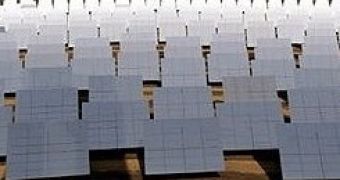The incredible amount of energy released by the Sun on a daily basis in the African deserts, if harnessed, could not only provide the whole African continent with electrical energy but might also be enough to power some parts of the European continent as well. Calculations show that the Sun produces about 1.5 barrels of petrol worth of energy for every square kilometer of desert. And as it turns out, Africa has plenty of desert areas.
"The largest source of energy is the solar radiation and the best place to receive solar radiation is the desert. Deserts get 700 times more energy per year than all human kind is using. It is as if a layer of 25 centimeters of oil is falling down in the deserts year after year", said Gerhard Knies, the project manager of the Trans-Mediterranean Renewable Energy Cooperation, at a meeting of the nine African states, which took place in Kenya.
Approximately 20 parliamentarians from Burundi, Djibouti, Ethiopia, Kenya, Madagascar, Rwanda, Tanzania, Uganda and Seychelles were present at the meeting, which addressed the problems related to the energetic issues of the poor.
"There is great need to provide the poorest people in east Africa with electricity. But at the same time there is an urgent need to combat climate change", said Nicholas Dunlop, the founder of the conference.
Extracting energy from the desert is not only very simple, but also much cleaner than other electric energy production techniques, such as burning fossil fuels for example. Still, more than half of the electric energy produced around the world is currently extracted from the energy released during the burning of fossil fuels.
All it takes is "a combination of mirrors and pipes to concentrate the sun's heat to boil water and drive an old fashion Steam turbine. Once you have built your mirrors and pipes your costs are finished. The good Lord does the rest", Dunlop explained.
Knies pointed out that the costs related to creating the infrastructure required for harnessing solar energy are steadily decreasing, especially in Europe where oil is becoming even more unpopular. Today, solar energy is considered some kind of supplement to the energy level produced with fossil fuel, when in fact we should imagine the situation the other way around.
"We are quite excited by this opportunity that the high oil prices begin to turn our policy makers to actually contribute and push for renewable energy", added Stephen Karekezi of the Environment and Development Network for Africa.

 14 DAY TRIAL //
14 DAY TRIAL //